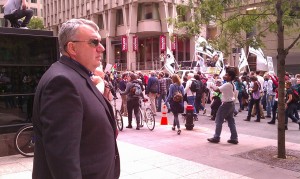In light of the horrific and wildly unexpected events that shocked the city of Boston – and the nation as a whole – law enforcement officials are considering a plethora of tactics to prevent similar events from occurring in the future. The shrapnel-packed bombs that rocked the finish line at this year’s Boston marathon slipped by the tight security that always accompanies the Patriot’s Day event. How, then, can police prevent another horrific event of this magnitude from falling through the protective cracks?
In one word, drones.
 Boston police commissioner Ed Davis said the city would consider the use of surveillance drones for next year’s marathon to assist law enforcement by providing an extra set of eyes to monitor the event. Speaking to WBZ News Radio 1030, Davis said that the use of drones is becoming a more common tactic across the country, and should be considered in Boston as well. He added, “there are certainly serious privacy concerns that we have to consider before we do something like that”.
Boston police commissioner Ed Davis said the city would consider the use of surveillance drones for next year’s marathon to assist law enforcement by providing an extra set of eyes to monitor the event. Speaking to WBZ News Radio 1030, Davis said that the use of drones is becoming a more common tactic across the country, and should be considered in Boston as well. He added, “there are certainly serious privacy concerns that we have to consider before we do something like that”.
The omnipotent presence imbibed in drone technology, with the ability to capture on-the-ground foot traffic and commotion as it hovers high above a scene, certainly has advantages when employed to assist an understaffed police force. Where thousands of individuals are clustered in a busy hub, the ability to monitor the scene for irregularities from an overhead visual source can help fill in blind spots. Davis himself mentioned that the drones would serve to compensate for a lack of helicopter surveillance, which Boston PD have not yet utilized at events like the marathon.
Still, with Davis himself admitting to the pervasive use of the technology nationwide, one wonders if drone implementation, even if done initially for worthwhile purposes, may quickly be abused, leading to spy planes flying over many of the city’s backyards and parks for a long time to come. After all, when have you heard of a police tactic, once employed – especially one as cost-effective and requiring such little manpower – becoming relegated to a “one use” policy. More likely, officials start to look for ways these helpful devices can be used to counter other crimes: drugs cultivation, possession of stolen items, even loitering.
The age-old debate of security versus privacy is complex and unlikely to be resolved in a discussion over a radio interview. Yet, the fact that Boston residents are likely unfamiliar with both the capability and already-prevalent use of drones nationwide is precisely the reason employing such a tactic can lead to undesired results. If utilized, it is also likely to result in myriad legal questions and proceedings, cluttering up the courts and throwing into the criminal justice system people who’ve done nothing criminal (say, cultivating marijuana plants caught by a drone’s watchful eye).
Davis also admitted that drones would not be the only tool necessary to effect stricter and more efficient security measures at the marathon. Increasing eye-level street surveillance, he said, would help “get a better look at exactly who’s in the area”. As those familiar with drone technology would attest, drones can’t be used at eye-level (imagine runners and onlookers frustratingly struggling to swat at more than just bees and flies).
Every illicit measure of surveillance begins with positive intentions. Let’s hope this is not one such case.